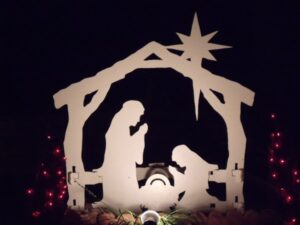Away in a Manger has long been a favorite Christmas Carol for many children as well as adults. The soft tune conjures up warm and cozy images of a stable’s comfy interior, complete with adoring shepherds and generous wise men. While this picture of the holy nativity dominates our thoughts of that first Christmas, there are some inaccuracies. Although the shepherds did arrive that first night, the Magi didn’t get there until several months, and possibly over a year, later. And the Bible tells us nothing about a little drummer boy on either occasion, even if he is a warm and fuzzy addition.
While our accommodating minds have heated the stable and filed off the sharp edges of the wooden manger, we often fail to realize that Jesus was born in an outbuilding. Many folks who didn’t grow up around a farm have come to picture a manger as a place to lay newborn babies, with a little hay thrown in for effect. But make no mistake. Jesus was laid in a feed trough in an unheated shelter for farm animals. It’s very likely that the actual birthplace was a cold damp cave since these were often used for barns in those days. The earliest traditions of Bethlehem point to a dark cavern as the birthplace for the Son of God.
I’m afraid our songs and nativity scenes have glamorized Jesus’ birth and removed much of the abject poverty these circumstances suggest. Jesus was born in a manger because there was no room in the inn. I suspect that if Joseph had the funds, a room could be had. But he did not. And while our Christmas pageants have often portrayed the stable as a generous offer of an overwhelmed innkeeper, the Bible doesn’t make this suggestion, though it may be true. It also may be true, however, that they spent the night with the animals because Joseph was resourceful and had learned to get by. Poor folks learn to do that very well. They navigate the leftovers and margins of those who can afford more.
If Joseph and Mary arrived last night to find No Vacancy signs in Woodstock and without money for other arrangements, they probably would have spent the night in their car like others did last night. But it’s a little more difficult to sleep on the back of a donkey, which, by the way, is also not mentioned in the Biblical account.
If we believe that God is sovereign and controls all aspects of this universe, and I do; and if we believe that He could arrange the circumstances surrounding the birth of His only begotten Son, and I do; then we must ask, why did He arrange for Jesus to be born in such a humble and homeless condition? Is it possible that God was sending a message to all those in similar situations that He cares and relates? Is it possible that He arranged these very events to demonstrate His love and concern for the least of these? And is it possible that when Jesus later stated in Matthew 25 that whoever welcomes in a stranger welcomes Him, that He was remembering His birth-night when there was no room with the wealthier inn-crowd?
As we reflect on the circumstances surrounding our Savior’s birth, it behooves us to consider God’s concern for the poor, indigent, and homeless. It should motivate us to ponder why He chose to arrive in this way, and to consider what we can do to help those in similar situations, for poverty is just as uncomfortable now as it was then.
As we celebrate Christmas in our warm homes around glittering trees with abundant gifts, let us reach out in love, compassion, and obedience to help those who were like Joseph, Mary, and Jesus on that first Judean Christmas. Let’s find room and resources for the Jesuses among us today. As you do so, may you sense His presence in your heart and home.
Merry Christmas, George